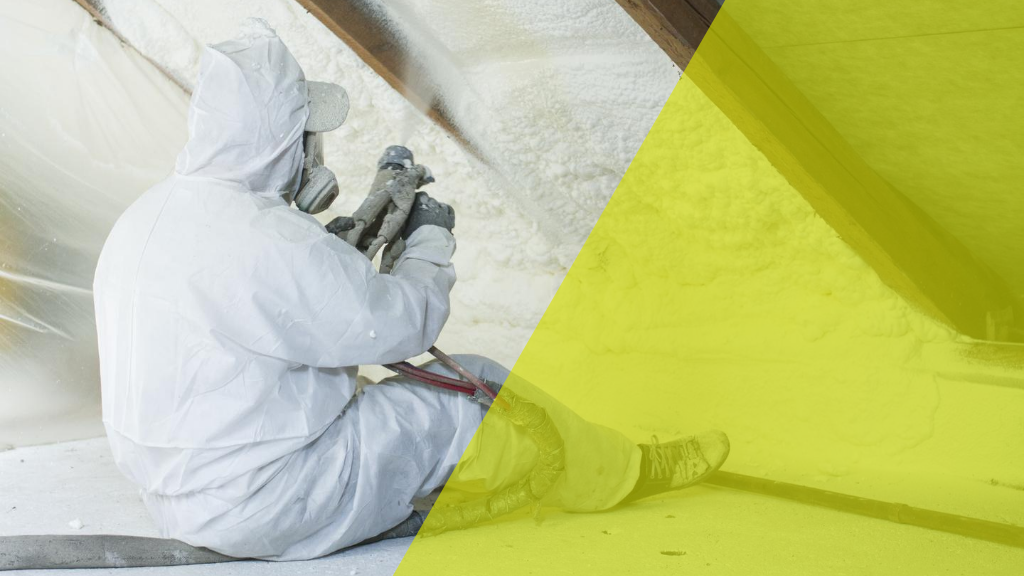
Before installing spray foam insulation, you must first consider the temperature of your environment.
Since spray foam is a mixture of chemicals, you can imagine that these chemicals will act differently under different temperatures.
Similarly, since spray foam starts as two liquids, you will need to find out what temperature each liquid freezes at.
There are many questions an insulation contractor may have about spray foam insulation and temperature. Read on to learn the answers to these common questions!
SO. WHAT’S NEXT?
After discovering the effects of temperature, you should then distinguish between the two types of spray foam insulation: open cell and closed cell.
Open cell spray foam is less expensive and lighter than closed cell, and it provides noise reduction and protection from mold.
Closed cell insulation tends to cost a bit more, but is more resistant to heat and moisture.
Make sure you find information for the kind of spray foam you use.
Below are the answers to some of the most common questions we receive at Accufoam®.
WHEN IS IT TOO COLD FOR SPRAY FOAM INSULATION?
The two different types of spray foam have different temperature ranges.
However, you should store both open cell and closed cell spray foam components at a temperature of at least 60 degrees Fahrenheit.
When you apply the spray foam, you want an ambient air temperature, and substrate temperature of at least 40 degrees Fahrenheit.
In theory, you may be able to apply cold cell spray foam at temperatures as low as 5 degrees Fahrenheit, but to ensure quality we recommend that you follow the 40 degrees Fahrenheit guideline.
CAN SPRAY FOAM FREEZE?
Spray foam components can freeze. The resin component of spray foam is more sensitive, and in cold temperatures will thicken and eventually freeze solid.
The plastic component does not freeze solid, but it can crystallize and become unusable.
Make sure you don’t store spray foam components at too low a temperature.
Want to learn more? Read this guide on applying spray foam insulation in cold weather.
HOW HOT CAN SPRAY FOAM GET?
In storage, neither open cell nor closed cell spray foam should be stored above 90 degrees Fahrenheit.
Spray foam insulation of any type should not be applied to a substrate or in an air temperature above 120 degrees Fahrenheit.
In storage, you also want to keep your spray foam insulation at least 3 inches from any heat source.
180 degrees Fahrenheit is the absolute maximum temperature for any aspect of spray foam insulation application.
AT WHAT TEMPERATURE SHOULD I APPLY SPRAY FOAM?
The two different spray foam types have different application temperature ranges.
When applying open cell insulation, you want your components heated between 120 and 140 degrees Fahrenheit, and your hose within the same temperature range.
Closed cell insulation requires a heating range between 110 and 130 degrees Fahrenheit.
These temperatures will provide the best quality insulation.
Want to learn more? Read this guide for some tips and tricks for spray foam insulation in hot and humid climates.
HOW CAN I MAKE SPRAY FOAM DRY FASTER?
It can take up to 24 hours for spray foam insulation to fully cure, although the outside will usually harden by the time an hour has passed.
Thicker applications take longer to fully cure. Spraying a light mist of water over spray foam insulation can, surprisingly, help to cure the insulation faster.
Applying spray foam insulation at the right temperature will help the insulation cure and dry properly in less time.
Now you should have a good grasp on how temperature impacts the application of spray foam insulation.
Knowing the ambient temperature, substrate temperature, and temperature of your components is key to using spray foam insulation properly.
If you follow application instructions and keep track of these temperatures, you should have durable and effective insulation.
WHAT MAKES ACCUFOAM® DIFFERENT?
Accufoam® has specifically adapted its formula to perform during applications where temperatures can be unruly.
We test every batch (in the Alabama sunshine and humidity) to ensure even in the most difficult circumstances, you can spray all day long with confidence that you’ll get a consistently high yield.
The air-tight formula is a superior barrier to air, moisture, and heat transfer.
With Accufoam®, you can confidently spray all day, without the frustration of clogging, the fear of separation, or the threat of delamination.
You have the confidence you’ll achieve specified R-Values and get a predictably high yield every job.
DISCOVER THE DIFFERENCE TODAY.
Are you a contractor interested in using spray foam insulation? Accufoam® provides both an ultra-low density spray foam and a medium density spray foam.
We’re excited to help you with your product, so contact us today and speak to a spray-foam expert at Accufoam®.


